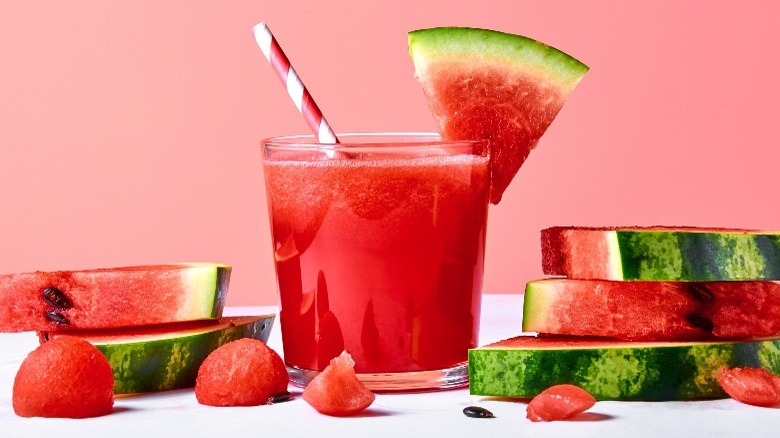Everything You Need To Know About The Watermelon Diet
If you love diving into watermelon, you're not alone. According to Statista, Americans ate over 14 pounds of watermelon in 2020.
Watermelon has been a popular sweet treat across the globe for centuries. The modern, domestic watermelon is thought to have originated in Sudan where farmers cultivated less bitter variants of wild watermelon over many generations to increase its sweetness. Researchers believe that Egyptian royalty may have even snacked on wild watermelon. King Tutankhamun was buried with watermelon seeds over 3,000 years ago, but lovers of watermelon may go back even further. Susanne Renner, a botanist at the Ludwig Maximilian University of Munich, told Live Science that she discovered a photograph of an Egyptian tomb painting that dates back over 4,300 years, depicting cut-up watermelon, alongside other sweet fruits.
In addition to being a refreshing treat, watermelon has some great health benefits. According to WebMD, watermelon contains lycopene, an antioxidant, which may help prevent cancer and diabetes while promoting heart health. Watermelon also contains a number of vitamins, such as vitamin A, which supports eye health and promotes smoother skin. Additionally, eating watermelon is an excellent way to stay hydrated.
While watermelon provides a lot of health benefits, does that mean it is nutritious enough to be the primary part of a weight loss plan?
The watermelon diet: pros and cons
First, what exactly is the watermelon diet? According to Shape, there are several versions out there, but they all primarily require you to only eat watermelon for a set period of time. While watermelon contains a number of vitamins and nutrients — and even some protein, if you count the edible seeds and fiber in the rind — a diet that dictates that you only eat watermelon raises a lot of flags for registered dietician, Kim Rose. This is because eating watermelon is essentially eating water — water is 90% of its make-up, Rose told Shape. Additionally, watermelon does not contain enough protein, carbohydrates, and fat to meet your body's needs. Watermelon diets are also often touted as cleanses, but Rose says that only eating watermelon does not clean out toxins. There is no evidence-based science that backs this up.
In addition to not providing your body with enough nutrients, there is another downside. Once you complete the watermelon diet, you will likely return to the way you were eating before. Nutrition consultant Jessica Marcus explained to Healthline that numerous studies have shown that fad diets like these don't change eating habits. Marcus adds that, while she doesn't recommend this kind of extreme diet, it is unlikely to be harmful. Speak to your doctor if you are interested in learning how to safely lose weight.

